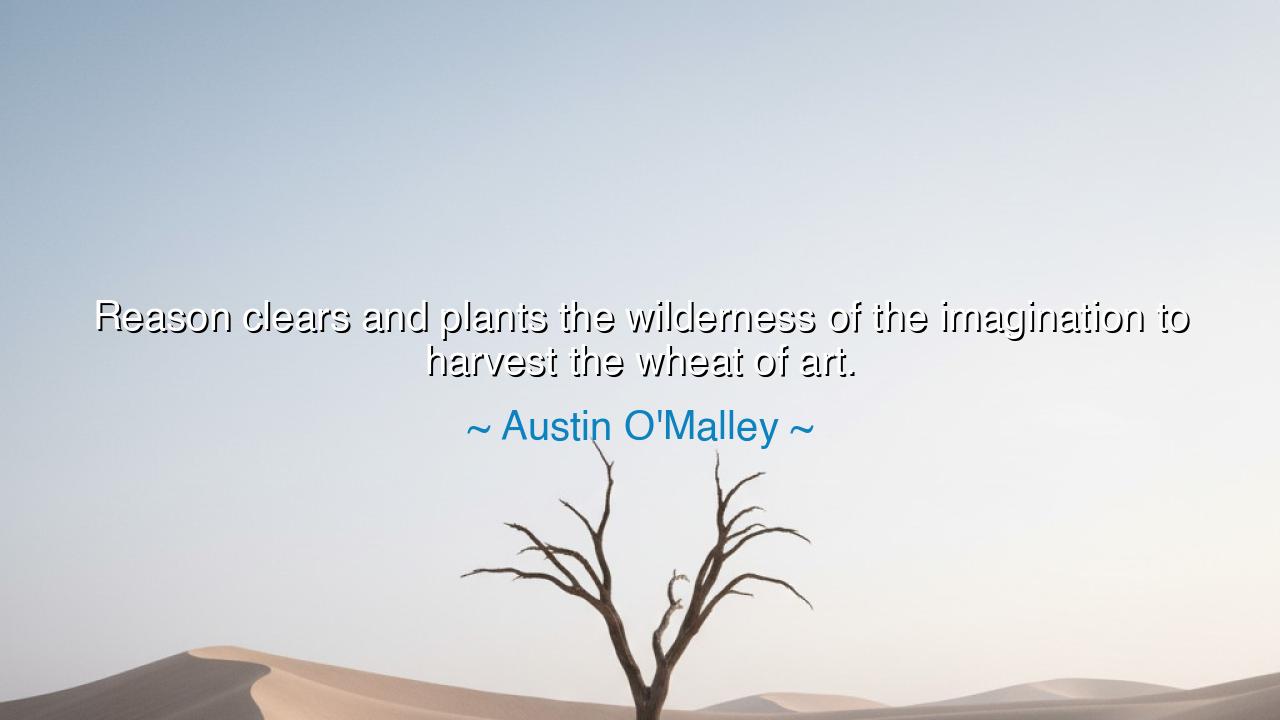
Reason clears and plants the wilderness of the imagination to
Reason clears and plants the wilderness of the imagination to harvest the wheat of art.






“Reason clears and plants the wilderness of the imagination to harvest the wheat of art.” — thus spoke Austin O’Malley, physician, philosopher, and poet of the early 20th century, whose mind wove science and spirit into one seamless cloth. In this radiant sentence, he reveals a truth that has echoed through the ages: that reason and imagination are not enemies, but partners in creation. O’Malley, a man of both intellect and insight, saw that the human mind is like a field — wild, fertile, and full of potential. Left untended, the wilderness of imagination can grow tangled with chaos and delusion. But when reason enters as the wise gardener, it does not destroy the wildness — it clears it, cultivates it, and prepares it to bear fruit. From that union comes the golden harvest — the wheat of art, nourished by imagination but refined by discipline.
The origin of this quote lies in O’Malley’s reflections on the nature of creativity and intellect. A doctor by profession, he approached both medicine and philosophy with the eye of a craftsman and the heart of a mystic. He believed that imagination was sacred — a divine spark — but that without the shaping hand of reason, it could not serve truth. His metaphor of “clearing” and “planting” evokes the ancient idea of cultivation, of turning wild soil into a living garden. Just as a farmer transforms the earth through labor and wisdom, so must the artist or thinker transform raw inspiration into beauty through thought and form.
In this teaching, O’Malley follows the lineage of the ancients. The Greek philosophers taught that reason was the charioteer of the soul, guiding the winged horses of passion and imagination toward the divine. Plato saw imagination as a bridge between the world of forms and the world of matter — it could reveal truth or distort it, depending on how it was governed. Aristotle, too, saw art as the meeting point of intellect and inspiration: the artist imagines freely, yet constructs deliberately. Thus, O’Malley’s vision continues this wisdom — he reminds us that imagination alone is raw energy, and reason alone is sterile logic; only their union births the living masterpiece.
Consider the example of Leonardo da Vinci, whose life embodies O’Malley’s principle. Leonardo was a dreamer of flying machines, an artist of impossible visions — yet he was also a man of mathematics, anatomy, and precision. His reason gave structure to his imagination; his imagination gave soul to his reason. The result was the Mona Lisa, the Vitruvian Man, and inventions centuries ahead of their time. Leonardo’s genius was not in choosing one over the other, but in harmonizing both — in clearing the wilderness of his imagination with the plow of reason, until the wheat of timeless art could grow.
Yet O’Malley’s words are not meant for artists alone. They speak to every soul that seeks to create, to understand, or to live wisely. Each of us carries within a wilderness — a tangle of dreams, fears, and impulses. If left untended, it can consume us in confusion. But if we approach it with clarity, with reason, we can shape it into something fertile. The wilderness of the imagination is where all creation begins — but the harvest, the lasting good, comes only when we bring order to that inner chaos. Thus, the true artist of life learns not to silence imagination, but to guide it.
In this light, reason is not the enemy of inspiration but its ally. It prunes without destroying; it plants without controlling. Reason gives direction to imagination, while imagination gives meaning to reason. Together, they reflect the harmony of the cosmos itself — chaos and order intertwined, the storm and the seed, the dream and the design. This balance is the essence of art, of wisdom, and of humanity’s highest endeavors.
And so, the lesson of Austin O’Malley resounds like an ancient bell: cultivate your inner field. Do not fear the wildness of your imagination, for it is the source of creation. But neither should you worship it blindly, lest it grow into thorns of madness or vanity. Let reason be your guide, your plow, your steady hand. Work upon your own mind as the farmer upon his land — clearing, planting, shaping, nurturing. In time, you will harvest the wheat of art — not only in the form of paintings, songs, or words, but in the greater art of living itself. For the life governed by both reason and imagination is the life most in tune with the rhythm of the divine: ordered yet free, disciplined yet inspired, bound by form yet limitless in spirit.






AAdministratorAdministrator
Welcome, honored guests. Please leave a comment, we will respond soon